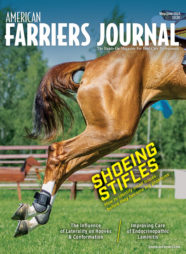In last week’s e-newsletter, American Farriers Journal Editor/Publisher Frank Lessiter previewed the Farrier Business Practices Survey. He also noted a 2012 survey by the American Horse Publications (AHP), a trade group of equine publishers. The AHP’s thorough survey covers the entire equine industry and showed that more than 80% of horse owners have kept their horses or acquired more within 1 year (closed in April 2012).
Regardless if you are optimistic or pessimistic, you can always find data within any survey to support your assertions. Also, broad-brush surveys like these simply can’t account for communities or the individual. Some will do well when things are bad, and some will suffer when things are terrific.
From Frank’s post, I did find a comment interesting. “Faye,” was critical of the findings and correctly stated that current conditions, like long-term effects of the drought, can stop any rebounding. However, in her criticism of the survey, she noted that horse owners aren’t doing better because, among other things, they are dealing with the high cost of farriers. She also indicated tough times cause horse owners to limit hoof care or hirer cheaper and possibly less qualified farriers.
She is spot-on that many owners make mistakes in management of hoof care when times are tough. I’m sure some owners will still make poor hoof-care management decisions when finances aren’t an issue. But how can one be critical of the high cost of hoof care?
Hoof care is one of several things an owner must take responsibility for when they choose to own a horse. No one must own a horse, and no one should make the decision to own one without thoroughly thinking through and committing to all of the financial responsibilities involved. During these tough times, many owners have made sacrifices because they were willing to forgo necessities and luxuries to keep their animals. However, when one begins to make sacrifices in the horse’s care so that they can keep it, then they are doing the animal a disservice. Here’s an idea that escapes many in our need-it-now, credit-driven culture: If you can’t afford it, then wait until you can.
It is insulting to the farrier industry to complain about the cost of hoof care. You are not simply paying for a trimming or shoeing. You are paying for that person’s investment of years and finances in their trade. Hours of practice in forging, attending educational events, researching theories and so many other things improve a hoof-care career of the years. The farrier’s invoice states what the owner paid for that day, but isn’t the owner really paying for those the experiences that made that qualified farrier able to provide that quality service that day?
And if you think hoof care is expensive, wait for the farrier and vet bills that will come from ignoring proper hoof care or opting for the cheapest person out there. It is akin to what former Harvard University president Derek Bok once stated: “If you think education is expensive, try ignorance.”








Post a comment
Report Abusive Comment